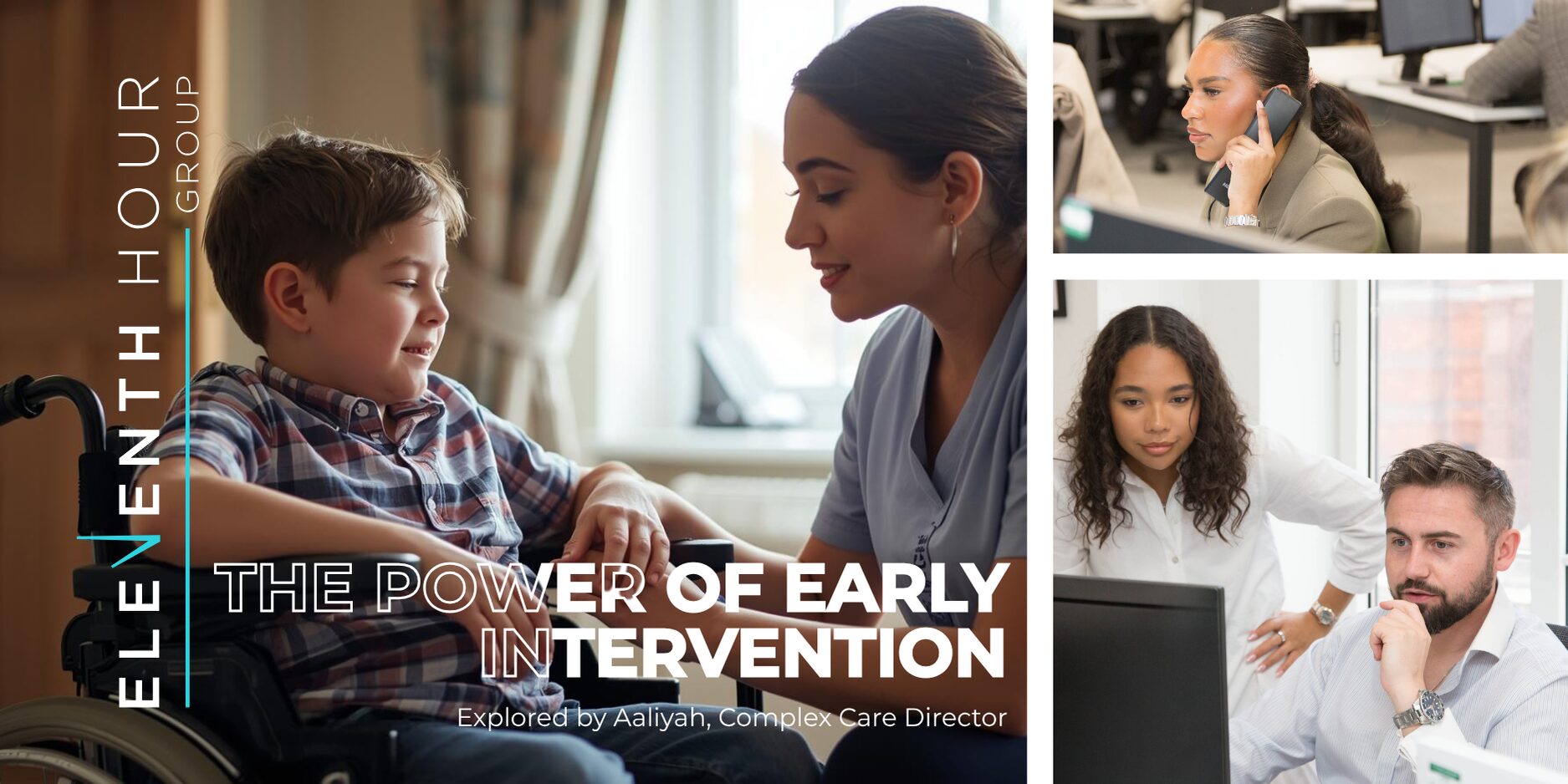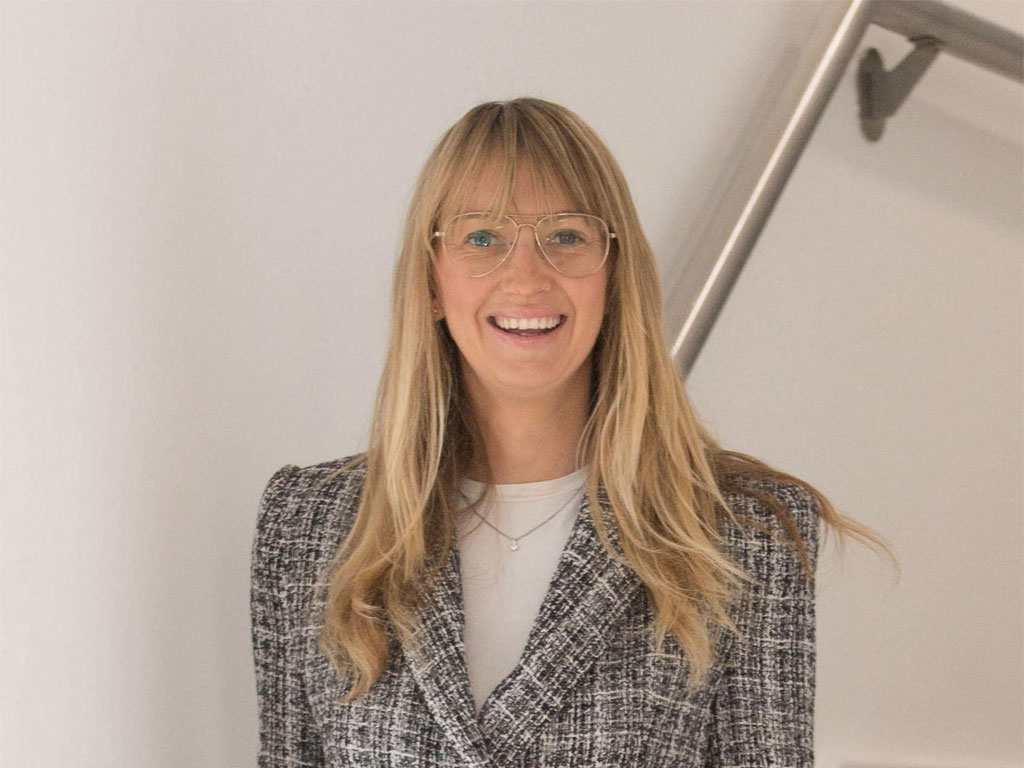
Complex Care Team’s Ruth, Dan and Ben at Eleventh Hour Group
When vulnerable people need urgent help, there is no time to wait for bureaucratic processes to catch up. Local Authorities and the amazing people who work within them, know the difference between a theoretical care models and ones that need to be delivered on the ground, in the real world, at pace and with precision. All the while, centred around the individuals at the heart of the packages.
That is where Eleventh Hour Group’s Complex Care Team steps in.
Our team specialises in providing emergency and short-notice Complex Care packages for children, young people and adults whose needs are not just complex on paper but often represent the very situations other providers find too difficult to handle. These are often cases where previous placements have broken down, where behaviours are heightened, or where high-risk scenarios demand a careful, coordinated response immediately, not in weeks or months.
This is not work for the faint-hearted.
It requires not only clinical and social care expertise but also emotional intelligence, advanced planning skills, and a genuine commitment to delivering person-centred care under pressure.
When the call comes in from a Local Authority, sometimes late at night or in the early hours, there is no room for delay or error. As we found when shadowing Complex Care Manager, Aaliyah last weekhttps://www.linkedin.com/pulse/behind-scenes-day-life-complex-care-team-manager-z8gwe. The team must assess the risk rapidly, develop a plan, mobilise staff, secure safe and appropriate accommodation if needed, and put in place robust risk mitigation processes to ensure the safety and wellbeing of the individual and the surrounding community.
But this work is not just about crisis management. It is about building sustainable, high-quality packages that give people stability, dignity and the opportunity to live as independently as possible. Eleventh Hour Group doesn’t see service users as placements to fill or problems to solve. We see them as people, each with their own history, needs and potential for growth.
This article outlines how our Complex Care Team responds to those urgent calls for help, collaborates with Local Authorities to stabilise crisis placements, and then works to deliver longer-term, person-centred packages that promote independence and reduce future risk. We will also share some of the operational detail behind how we maintain quality and consistency, even under the most pressing circumstances.

Complex Care Manager, Aaliyah and Business Development Executive Dan
Stepping Up When Others Step Away
In the moment where others step down, Eleventh Hour Group steps up. Our Complex Care Team are highly skilled in supporting highly complex cases where service users have previously been failed.
This morning, a conversation with a local authority who had historically relied on another organisation confirmed that our team do go above and beyond. The service user’s placement had broken down and the Local Authority desperately needed a team to come through for them. To provide safety, security and sanctuary. Within moments of the call ending, the team leapt to work. Operating with speed, precision and care to secure the future for this individual who so needed our help.
The work now was to assess the risk, create the plan, put in risk mitigation processes, secure the property, and create a robust package. No easy feat, but nothing this team cannot handle.
There is a buzz at the desk. A momentum that generates pace, rapid responses and precision when securing the best for vulnerable service users. The team share a consistent and combined belief that our service users deserve the best quality to live the most independent lives as possible. Our team don’t just seek to place service users, we aim to see them thrive as independently as possible. It is a collective mission.
Maintaining High Standards for Support and Building Effective Risk Mitigation Processes
To ensure the highest quality in standards, and ensure the success of packages, it is imperative the team spot inflection points that could lead to challenges down the line as part of the risk mitigation model. Not all inflection points are inherently bad. However, a during times of significant change in a situation, or turning points, it is vital to ensure the outcomes are factored in. This is especially true when the core people at the heart of the Complex Care Team’s work are vulnerable people.

Complex Care Team’s Jenae and Eddie at Eleventh Hour Group
Prevention of Risks Throughout the Duration of Packages
To ensure packages run as smoothly as possible, a large part of the risk mitigation model is prevention of issues later down the line. Preventative measures and ongoing items to ensure safety are part of the more operational day-to-day activities of ‘Business As Usual’ (BAU).
As with planning, prevention always starts with the individual. To prevent any negative outcomes arising, and mitigate risk the team operates a secure system of operational actions aligned with the overall strategy. This involves a combination of processes, including but not an exhaustive list.
1. A weekly review for each package.
Each are package undergoes a thorough weekly review to ensure it remains fit for purpose and responsive to the individuals’ unique needs. To avoid static checklists, they must centre around active implementation, refinement, development of plans with updates shared transparently with key stakeholders to maintain accountability and quality.
2. Placement visits.
Our team prioritises in-person engagement. This means taking early trains, meeting service users face to face, holding staff meetings on-site, conducting spot checks of properties, and completing detailed risk assessments. These visits build trust, strengthen relationships, and ensure proactive planning is always informed by real-world condition.
3. Always remembering the settings are our service users’ homes.
We never lose sight of the fact that our placements are people’s homes, not just facilities. This means delivering truly person-centred care with dignity and respect. Every decision is grounded in the belief that the service user is at the heart of the plan, and that their safety, comfort, and sense of belonging matter deeply.
4. Improvement on quality of care.
Our risk mitigation model is not about maintaining the status quo, but about driving continuous improvement in the quality of care delivered. This includes regularly evaluating staff practices, listening to feedback from service users and families, and adopting innovations that enhance independence, safety, and wellbeing.
5. Always being available for parents throughout the day, and for respite.
We know that carers and parents are integral to the support system. That’s why our team ensures clear and consistent lines of communication throughout the day, offering guidance, reassurance, and practical support. Respite options are thoughtfully planned, recognising the vital importance of giving families space to rest and recharge.
6. Shift in involvement. Packages, long-term plans, care plans, longer-term projects.
Our work now really goes beyond urgent crisis responses. Whilst historically, this was our main role, we’ve now organically evolved the service for the better. We collaborate with local authorities to design longer-term packages and care plans, moving from immediate placement to sustained, strategic support. This ensures a smooth transition from short-term intervention to meaningful, stable outcomes for the service user.
7. Giving people independence.
At the core of our mission is the belief that everyone deserves the chance to live as independently as possible. Our planning always focuses on building capacity, enabling choice, and reducing dependency wherever safe and appropriate, so people can enjoy meaningful control over their own lives.
8. Giving people control.
We embed personal agency into every aspect of our care. Service users are included in planning decisions wherever possible, with support adapted to respect their wishes and preferences. By empowering people to make choices about their own care, we promote dignity and respect in all that we do.
9. Improve the quality of care to promote independence.
One of our core aims is to enable our service users to live as independently as possible and believe in their capacity to grow and improve. Our packages are designed to improve quality of life in measurable ways. Through structured plans, tailored interventions, and consistent, compassionate support, we help service users develop more positive behaviours and greater capacity to manage daily tasks. This progress is celebrated and built upon over time. What we witness is wonderful. Service users become more relaxed, feel more secure, engage in more positive interactions and develop meaningful connections with those who support them. Often this leads to greater independence.
10. Step in when other agencies have failed.
Perhaps most importantly, Eleventh Hour Group is there when others cannot be. We specialise in stepping in when placements have broken down or when needs have been deemed too complex to manage. Our team prides itself on responding rapidly, rebuilding trust, and delivering safe, robust packages when people need it most.

Complex Care Team Meeting at Eleventh Hour Group
Our Closing Thoughts
At Eleventh Hour Group Complex Care, we do not take lightly the responsibility that Local Authorities place in us when they pick up the phone in the middle of a crisis.
These individuals are often the most vulnerable members of our society, people with multiple, overlapping needs who have already experienced disruption, trauma, or failure of previous systems to meet their needs.
When another agency says, “We can’t,” we aim to say, “We will find a way.”
Our approach is built on a foundation of practical expertise and human compassion. The planning that begins within moments of receiving an emergency call is carried through every day of that individual’s package, with structured reviews, robust risk management, and a deep understanding that this is not just a service but someone’s home and life. We hold ourselves to the highest standards because we know the stakes are high, and we know that trust is earned through consistent delivery.
But this work also requires collaboration.
We do not do it alone.
We work in close partnership with Local Authority commissioners, social workers, families and other agencies to ensure the best possible outcomes. We share our expertise to help design longer-term strategies, recognising that true risk mitigation goes beyond putting out fires and instead focuses on building resilience into every package.
Our mission is not simply to place people somewhere quickly, but to help them thrive. To see them regain independence, confidence, and hope for the future. That means investing in our staff, continually refining our processes, listening to feedback, and never losing sight of why we do this work in the first place.
Eleventh Hour Group is proud to be a partner of choice for Local Authorities who need responsive, accountable, high-quality Complex Care provision. We remain committed to stepping up in the moments when others step back, and to doing so with care, precision, and above all, respect for the people we serve.
At its core, the primary function of Complex Care is the creation of a secure placement for vulnerable service users. A place they are safe within, both psychologically and physically. A space where they can thrive. A home.
That is where Eleventh Hour Group’s Complex Care Team steps in.
Our team specialises in providing emergency and short-notice Complex Care packages for children, young people and adults whose needs are not just complex on paper but often represent the very situations other providers find too difficult to handle. These are often cases where previous placements have broken down, where behaviours are heightened, or where high-risk scenarios demand a careful, coordinated response immediately, not in weeks or months.
This is not work for the faint-hearted.
It requires not only clinical and social care expertise but also emotional intelligence, advanced planning skills, and a genuine commitment to delivering person-centred care under pressure.
When the call comes in from a Local Authority, sometimes late at night or in the early hours, there is no room for delay or error. As we found when shadowing Complex Care Manager, Aaliyah last weekhttps://www.linkedin.com/pulse/behind-scenes-day-life-complex-care-team-manager-z8gwe. The team must assess the risk rapidly, develop a plan, mobilise staff, secure safe and appropriate accommodation if needed, and put in place robust risk mitigation processes to ensure the safety and wellbeing of the individual and the surrounding community.
But this work is not just about crisis management. It is about building sustainable, high-quality packages that give people stability, dignity and the opportunity to live as independently as possible. Eleventh Hour Group doesn’t see service users as placements to fill or problems to solve. We see them as people, each with their own history, needs and potential for growth.
This article outlines how our Complex Care Team responds to those urgent calls for help, collaborates with Local Authorities to stabilise crisis placements, and then works to deliver longer-term, person-centred packages that promote independence and reduce future risk. We will also share some of the operational detail behind how we maintain quality and consistency, even under the most pressing circumstances.
Stepping Up When Others Step Away
In the moment where others step down, Eleventh Hour Group steps up. Our Complex Care Team are highly skilled in supporting highly complex cases where service users have previously been failed.
This morning, a conversation with a local authority who had historically relied on another organisation confirmed that our team do go above and beyond. The service user’s placement had broken down and the Local Authority desperately needed a team to come through for them. To provide safety, security and sanctuary. Within moments of the call ending, the team leapt to work. Operating with speed, precision and care to secure the future for this individual who so needed our help.
The work now was to assess the risk, create the plan, put in risk mitigation processes, secure the property, and create a robust package. No easy feat, but nothing this team cannot handle.
There is a buzz at the desk. A momentum that generates pace, rapid responses and precision when securing the best for vulnerable service users. The team share a consistent and combined belief that our service users deserve the best quality to live the most independent lives as possible. Our team don’t just seek to place service users, we aim to see them thrive as independently as possible. It is a collective mission.
Maintaining High Standards for Support and Building Effective Risk Mitigation Processes
To ensure the highest quality in standards, and ensure the success of packages, it is imperative the team spot inflection points that could lead to challenges down the line as part of the risk mitigation model. Not all inflection points are inherently bad. However, a during times of significant change in a situation, or turning points, it is vital to ensure the outcomes are factored in. This is especially true when the core people at the heart of the Complex Care Team’s work are vulnerable people.

Complex Care Jenae at Eleventh Hour Group
Prevention of Risks Throughout the Duration of Packages
To ensure packages run as smoothly as possible, a large part of the risk mitigation model is prevention of issues later down the line. Preventative measures and ongoing items to ensure safety are part of the more operational day-to-day activities of ‘Business As Usual’ (BAU).
As with planning, prevention always starts with the individual. To prevent any negative outcomes arising, and mitigate risk the team operates a secure system of operational actions aligned with the overall strategy. This involves a combination of processes, including but not an exhaustive list.
1. A weekly review for each package.
Each are package undergoes a thorough weekly review to ensure it remains fit for purpose and responsive to the individuals’ unique needs. To avoid static checklists, they must centre around active implementation, refinement, development of plans with updates shared transparently with key stakeholders to maintain accountability and quality.
2. Placement visits.
Our team prioritises in-person engagement. This means taking early trains, meeting service users face to face, holding staff meetings on-site, conducting spot checks of properties, and completing detailed risk assessments. These visits build trust, strengthen relationships, and ensure proactive planning is always informed by real-world condition.
3. Always remembering the settings are our service users’ homes.
We never lose sight of the fact that our placements are people’s homes, not just facilities. This means delivering truly person-centred care with dignity and respect. Every decision is grounded in the belief that the service user is at the heart of the plan, and that their safety, comfort, and sense of belonging matter deeply.
4. Improvement on quality of care.
Our risk mitigation model is not about maintaining the status quo, but about driving continuous improvement in the quality of care delivered. This includes regularly evaluating staff practices, listening to feedback from service users and families, and adopting innovations that enhance independence, safety, and wellbeing.
5. Always being available for parents throughout the day, and for respite.
We know that carers and parents are integral to the support system. That’s why our team ensures clear and consistent lines of communication throughout the day, offering guidance, reassurance, and practical support. Respite options are thoughtfully planned, recognising the vital importance of giving families space to rest and recharge.
6. Shift in involvement. Packages, long-term plans, care plans, longer-term projects.
Our work now really goes beyond urgent crisis responses. Whilst historically, this was our main role, we’ve now organically evolved the service for the better. We collaborate with local authorities to design longer-term packages and care plans, moving from immediate placement to sustained, strategic support. This ensures a smooth transition from short-term intervention to meaningful, stable outcomes for the service user.
7. Giving people independence.
At the core of our mission is the belief that everyone deserves the chance to live as independently as possible. Our planning always focuses on building capacity, enabling choice, and reducing dependency wherever safe and appropriate, so people can enjoy meaningful control over their own lives.
8. Giving people control.
We embed personal agency into every aspect of our care. Service users are included in planning decisions wherever possible, with support adapted to respect their wishes and preferences. By empowering people to make choices about their own care, we promote dignity and respect in all that we do.
9. Improve the quality of care to promote independence.
One of our core aims is to enable our service users to live as independently as possible and believe in their capacity to grow and improve. Our packages are designed to improve quality of life in measurable ways. Through structured plans, tailored interventions, and consistent, compassionate support, we help service users develop more positive behaviours and greater capacity to manage daily tasks. This progress is celebrated and built upon over time. What we witness is wonderful. Service users become more relaxed, feel more secure, engage in more positive interactions and develop meaningful connections with those who support them. Often this leads to greater independence.
10. Step in when other agencies have failed.
Perhaps most importantly, Eleventh Hour Group is there when others cannot be. We specialise in stepping in when placements have broken down or when needs have been deemed too complex to manage. Our team prides itself on responding rapidly, rebuilding trust, and delivering safe, robust packages when people need it most.

Eleventh Hour Group’s Complex Care Team
Our Closing Thoughts
At Eleventh Hour Group Complex Care, we do not take lightly the responsibility that Local Authorities place in us when they pick up the phone in the middle of a crisis.
These individuals are often the most vulnerable members of our society, people with multiple, overlapping needs who have already experienced disruption, trauma, or failure of previous systems to meet their needs.
When another agency says, “We can’t,” we aim to say, “We will find a way.”
Our approach is built on a foundation of practical expertise and human compassion. The planning that begins within moments of receiving an emergency call is carried through every day of that individual’s package, with structured reviews, robust risk management, and a deep understanding that this is not just a service but someone’s home and life. We hold ourselves to the highest standards because we know the stakes are high, and we know that trust is earned through consistent delivery.
But this work also requires collaboration.
We do not do it alone.
We work in close partnership with Local Authority commissioners, social workers, families and other agencies to ensure the best possible outcomes. We share our expertise to help design longer-term strategies, recognising that true risk mitigation goes beyond putting out fires and instead focuses on building resilience into every package.
Our mission is not simply to place people somewhere quickly, but to help them thrive. To see them regain independence, confidence, and hope for the future. That means investing in our staff, continually refining our processes, listening to feedback, and never losing sight of why we do this work in the first place.
Eleventh Hour Group is proud to be a partner of choice for Local Authorities who need responsive, accountable, high-quality Complex Care provision. We remain committed to stepping up in the moments when others step back, and to doing so with care, precision, and above all, respect for the people we serve.
At its core, the primary function of Complex Care is the creation of a secure placement for vulnerable service users. A place they are safe within, both psychologically and physically. A space where they can thrive. A home.








